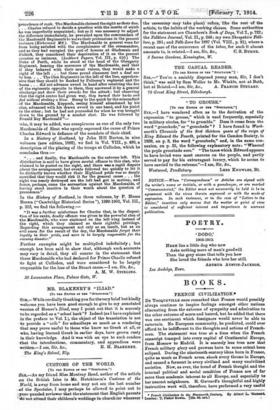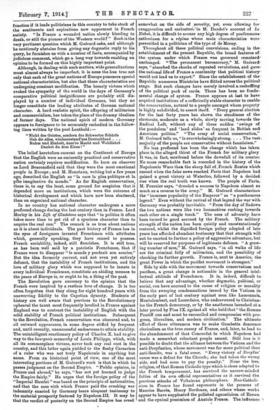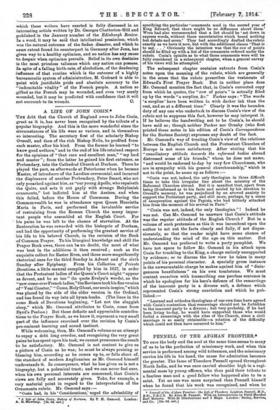BOOKS.
FRENCH CIVILIZATION.•
DE TOCQUE VILLE once remarked that France would possibly always continue to inspire feelings amongst other nations alternating from the extreme of sympathy and admiration to the other extreme of scorn and hatred, but he added that there was one sentiment which foreigners would never be able to entertain. No European community, he predicted, could ever afford to be indifferent to the thoughts and actions of French- men. The statement was true at a time when the French conscript tramped into every capital of Continental Europe, from Moscow to Madrid. It is scarcely leas true now that French military glory and prowess have to some extent been eclipsed. Daring the nineteenth century ideas born in France, quite as much as French arms, shook every throne in Europe, and canoed a ferment in every civilized and many uncivilized societies. Now, as ever, the trend of French thought and the internal political and social condition of France are of far more than academia interest to all Europe, and especially to her nearest neighbours. M. Gu6rard's thoughtful and highly instructive work will, therefore, have performed a very useful • Frmch CivitUaltow is the Niseteroth Century. By Albert L. lilltereed. London T. Fisher Marvin. DN. Id. sail fmaction if it leads politicians in this country to take stock of the sentiments and aspirations now uppermost in French society. "Is France a wounded nation slowly bleeding to death, or still the pioneer of the Western world? " Such is the very pertinent question which M. G aerard asks, and although- he cautiously abstains from giving-any dogmatic reply to his query, he furnishes na with a number. of facts, accompanied by judicious comment, which go a long-way towards enabling an opinion to be formed on this highly important point. Although, in dealing with such matters, wide generalizations must almost always be-imperfect, it ie none the less true not only that each of the great nations of Europe possesses special national characteristics, brit also that those characteristics are undergoing constant modification. The homely virtues which evoked the sympathy of the world in the days of Germany's comparative political insignificance are probably still dia• played by a number of individual Germans, but they no longer constitute the leading attributes of German national character. A hard realistic spirit, the offspring of militarism and commercialism, has taken the place of the dreamy idealism- of former days. The national spirit of modern Germany appears to foreigners to be accurately embodied is the follow- ing lines written by the poet Leuthold
" Nicht dee Geistee, sondem des Schwertes Sebirfe Gab dir alley, wiedererstand'nes Deutschland . .
Ruhm nod Eiuheit, auss're Macht and Wohlfahrt Dankst du dem Eisen!"
The belief heretofore current on the Continent of Europe that the English were an eminently practical and conservative nation certainly requires modification. So keen an observer as Lord Beaconsfield said that they were the most emotional people in Europe ; and M. Hanotaux, writing but a few years ago, described the English as "la race la plus politique et In pros imaginative du monde." As for English conservatism, there is, to say the least, some ground for suspicion that it depended more on institutions, which were the outcome of historical, development and which have now been shattered, than on engrained national character.
In no country has national character undergone a more profound change during the last century than in France. Lord Morley in his Life of Gladstone says that " in politico it often takes more time to get rid of a spurious character than to acquire the real one." The remark is as true about nations as it is about individuals. The past history of France has in the eyes. of foreigners invested Frenchmen with attributes which, generally speaking, they have ceased to possess. French sociability, indeed, still flourishes. It is still true, as has been well said by a patriotic Frenchman, that if France were to disappear "le monde y perdrait son sourire." But the idea formerly current, and not- even yet entirely defunct, that the instability of French institutions, and the love of military glory which was supposed to be innate in every individual Frenchman, constitute an abiding menace to the peace of Europe is, or ought to be, a thing of the past.
The Revolution gave currency to the opinion that the French were inspired by a restless love of change. It is too often forgotten that they clung for eight hundred years with unswerving fidelity to the Capetian dynasty. Students of history are well aware that previous to the Revolutionary upheaval the taunt most frequently levelled in France against England was to contrast the instability of English with the solid stability of French political institutions. Subsequent to-the Revolution, French conservatism was obscured and, to all outward appearance, in some degree stifled by frequent and, until recently, unsuccessful endeavours to attain stability. The unintelligent reactionary policy of Charles X. bad to give way to the bourgeois monarchy of Louis Philippe, which, with all its commonplace virtues, never took any real root in the country, and this latter again yielded to the flashy Caesarism of a ruler who was not truly Napoleonic in anything but name. From an historical point of view, one of the most interesting portions of M. Gaerard's work is that in which he passes judgment on the Second Empire. "Public opinion, in France and abroad," he says, "has not yet learned to judge the Empire fairly." He urges that the foreign policy of the "Imperial Hamlet " was based on the principle of nationalities, and that the ease with which France paid the crushing war indemnity exacted by Germany bears eloquent testimony to the material prosperity fostered by Napoleon ILL It may be that the verdict of posterity on the Second Empire- has .erred somewhat on the side of severity, yet, even allowing for exaggeration and caricaturl! in M. Daudet's account of Le Nebel), it is difficult to arouse any high degree of posthumous enthusiasm for a regime. whose main characteristics- were personified in a politician of the type of de Moray.
Throughout all these political convulsions, ending in the. establishment of the present Republic, the broad features of
the- system under which France was governed remained' unchanged. "The. permanent bureaucracy," M. Guerard- says, "absorbed the shocks of repeated revolutions, and gave, the national life of France a continuity that political history would not lead us to expect." Since the establishment of the- Republic numerous Ministries have flitted across the political' stage. But such changes have merely involved a reshuffling •
of the political pack of cards. There has been no funda- mental change of system. France appears at last to- have
acquired institutions of a sufficiently stable character to enable - the conservatism, natural to-a people amongst whom property is highly subdivided, to assert itself. "Every general election for the last forty years has shown the steadiness of the'
electorate, moderate as a whole, slowly moving, towards the Radical Left, without any of those sudden 'swings of
the pendulum ' and ' land slides' so frequent in British and American politics," "The army of social conservation.'.' M. Guerard tells us, " is overwhelmingly strong.. . . The vast, majority of the people are conservative without fanaticism."
No less profound has been the change which has .taken place in the alleged thirst of the Freud' for military glory It was, in fact, moribund before the downfall of its creator. No more remarkable fact is recorded in the history of the Napoleonic Ware than the sharp fall of, French Routes which ensued when the false news reached Paris that Napoleon had gained a great victory at Waterloo, followed by a decided - rise when the real truth was known. The people of. Paris,. M. Fournier says, "dreaded. a success to Napoleon almost as much as a reverse to the army." M. Guerard characterizes the "immense popularity of the Emperor" as "a posthumous legend." Even without the revival of that legend the war with
Germany was probably inevitable. "From the day of Sadowa the two nations were like two locomotives rushing towards each other on a single track." The uses of adversity have-
been turned to good account by the French. The military strength of the nation has been quietly and unostentatiously restored, whilst the dignified foreign policy adopted of late years has afforded abundant testimony that that strength will not be exerted to further a policy of aggressive adventure, but will be reserved for purposes of legitimate defence. " A grow- ing number of men," M. Guerard says, " in all walks of life see the criminal folly of militarism, and the possibility of checking its further growth. France is, next to America, the great Power in which the pacifist movement is strongest."
Side by side with the movement towards conservatism and pacifism, a great change is noticeable in the general intel- lectual attitude of Frenchmen. It is, indeed, difficult to believe that any advantage, whether dogmatic, political, or social, can have accrued to the cause of religion or morality from the sweeping condemnations issued by the Vatican in the early part of but century against men like Lamennais, Montalembert, and Lacordaire, who endeavoured to Christian- ize the French democracy, or by the anathemas launched at a later period by Pius IX: against all who held that" the Roman Pontiff can and must be reconciled and compromise with pro- gress, liberalism, and modern civilization." The ultimate effect of these utterances was to make Gambetta denounce clericalism as the true enemy of France, and, later, to lead to the abandonment of that Concordat to which Napoleon had made a somewhat reluctant people assent. Still less is it possible to doubt that the alliance between the Vatican and the anti-Dreyfusites, whose movement was far more political than anti-Semite, was a fatal error. "Every victory of Dreyfus' cause was a defeat for the Church; she had taken the wrong side, and had soon to pay the penalty." None the less, religion, of that Roman Catholic type which isalone adapted to the French temperament, has survived the narrow-minded follies of its own official representatives as it survived the previous attacks of Voltairean philosophers. Neo-C/atholi- oism in France has found exponents in the persons of Maurice Barres, Henry Bordeaux, and others whose works appear to have supplanted the polished agnosticism of Henan and the cynical pessimism of Anatole France: The influenee
which these writers have exerted is fully discussed in an interesting article written by Dr. Georges Chatterton-Bill and published in the January number of the Edinburgh Review. In a word, it may be said that intellectual pessimism, which was the natural outcome of the Sedan disaster, and which to same extent found its counterpart in Germany after Jena, has given way to a healthy optimism, and no nation has any cause to despair when optimism prevails. Belief in its own destinies is the most priceless talisman which any nation can possess. In spite of a falling birth-rate, of alcoholism, of the deadening influence of that routine which is the outcome of a highly bureaucratic system of administration, M. Guerard is able to point with justifiable pride and absolute accuracy to the -"indomitable vitality" of the French people. A nation so gifted as the French may be wounded, and even very sorely wounded, but it may be predicted with confidence that it will












































 Previous page
Previous page